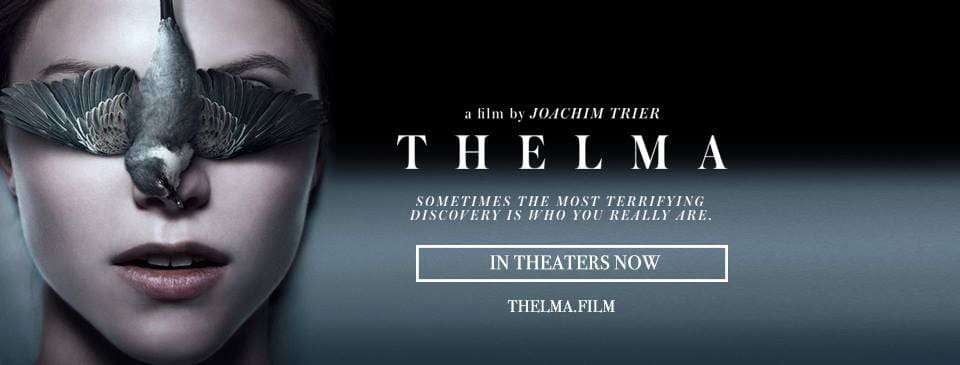Thelma is a story of girl-meets-girl. The titular character is the daughter of Christian fundamentalists living in the mountains of Norway who, finally, gets a taste of independence when she heads to college. She struggles to make friends, but things start to look up when she meets Anja, a classmate who introduces her to clubs, wine, cigarettes, and dance. It’s not long before their friendship becomes something more. Oh, Thelma is also suffering from horrible seizures that may be connected to traumatic childhood memories, recurring nightmares about snakes, and the telepathic powers she can’t control.
So, maybe Thelma isn’t just a story of girl-meets-girl.
It’s that sense of creativity and unpredictability that makes Thelma worth noticing. This is that rare sort of film that seamlessly moves from one genre to the next, eventually having all its loose threads tie together in a way that, somehow, makes sense. Part romance, part thriller, part exploration of repressive households, with dashes of social commentary and psychological horror thrown in for good measure, there’s noting quite like Thelma out there.
Director Joachim Trier is best known for his intimate family dramas, but he seems right at home in the horror/thriller genres based on his shockingly strong work behind the camera in Thelma. The movie is at its best whenever it lets things get weird and creepy, with some really striking imagery and drawn out suspense. The film makes great use of editing and cinematography, even if the visuals are occasionally hampered by wonky CGI.
When the film ventures out of this territory, it isn’t quite as effective, but there are still some strong moments. The development of Thelma and Anja’s romance feels natural and sweet, and the film probes some interesting ideas about repression and religion. In the film’s very best moment, Trier combines all his different themes and genres into a brilliantly weird erotic fantasy sequence that’s as hypnotic as it is mysterious.
Unfortunately, the film can’t quite maintain its tightrope walk between genres through the very end. The film’s final third has pacing problems, with far too many important details being revealed to the audience just as they become important. Thelma’s parents, who were fascinating but somewhat flat characters in the beginning, suddenly undergo a transition that doesn’t quite earned, and their interactions with their daughter become a bit too repetitive. While a terrific final scene, that’s either heartwarming or creepy depending on your interpretation of the film, ultimately saves the third act it’s somewhat disappointing that Trier couldn’t completely stick the landing.
It’s also worth noting that the film’s subtext becomes a bit clouded, especially in the final act. Thelma is a very political, progressive film that argues for the proper education of young people, and advocates for their exposure to diverse groups of people. But Thelma, the character, makes certain decisions during the movie’s finale that almost work against this message. While these actions help the film conclude as a satisfying horror movie, they somewhat undermine the movie’s thesis statement.
Imperfect, but still impressive and often hypnotic, Thelma is certainly a unique film. While it may borrow small pieces from the likes of Carrie, The Virgin Suicides, and Blue is the Warmest Color, it manages to feel like something entirely new and special, even when it’s not quite as entertaining as it’d like to be. Whether you’re looking for a thought provoking drama, an absorbing romance, or a terrifying horror film, Thelma has something for you – and it’s worth the time and attention.
Overall rating: 7 out of 10.


